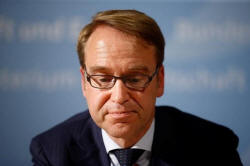|
Risks of ultra-easy ECB
policy increasingly clear: Weidmann
 Send a link to a friend
Send a link to a friend
 [November 04, 2016]
AMSTERDAM/ [November 04, 2016]
AMSTERDAM/
FRANKFURT
(Reuters) - European Central Bank policymaker Jens Weidmann called on
Thursday for "patience" with bank monetary policy, warning that
extraordinary stimulus loses its effect over time while increasing
stability risk.
"All in all, the risks of ultra-loose monetary policy are becoming
increasingly clear," he told a business forum in Amsterdam.
"It is important to give the measures taken enough time to have an
impact on the inflation rate," he added.
"This focus on the medium term – alongside the fact that the euro area
is still struggling to overcome the longer-term economic implications of
the biggest economic shock since World War II – underscores the merits
of patience."
The comments from Weidmann, who heads Germany's Bundesbank, come as the
ECB contemplates whether to extend a 1.74 trillion-euro asset-buying
scheme next month to boost growth and prop up inflation, which has
missed the bank's 2 percent target for over three years running.

While sources close to the ECB's deliberations say some form of
extension is almost certain, Weidmann pointed to a growing body of
positive economic evidence that would justify a more subdued role for
the bank.
"From a cyclical perspective at least, there is a ray of hope on the
horizon," Weidmann said, arguing that the euro zone will grow faster
than potential in the next few years.
"We shouldn't ignore the fact that, even with monetary policy rates
unchanged, the increase in inflation rates automatically leads to lower
short-term real interest rates and, therefore, to a further loosening of
the monetary policy stance."
Ultra-low rates can fuel asset bubbles, cut bank profitability and
encourage more government spending, all putting financial stability at
risk, Weidmann said.
[to top of second column] |

Central Bank (Bundesbank) Chief Jens Weidmann attends a press
conference after the Franco-German Financial Council meeting in
Berlin, Germany, September 23, 2016. REUTERS/Axel Schmidt

"Admittedly, bank profitability and the sustainability of life insurance
and pension companies' business models is not a target of a monetary
policy," said Weidmann, an ECB hawk who has often taken minority
positions in key decisions.
"But monetary policy cannot afford to ignore these developments if
banks’ health problems endanger the monetary transmission mechanism, or
doubts about the stability of life insurance or pension companies prompt
households to increase their precautionary savings."
Defending banks, Weidmann said new regulations known as Basel III should
not lead to a significant rise in capital requirements and moving away
from capital needs based on risk-weighting of assets was not
appropriate.
(This version of the story corrects the 7th paragraph to show that above
potential growth is seen for the coming years)
(Reporting by Balazs Koranyi and Francesco Canepa; editing by Andrew
Roche)
[© 2016 Thomson Reuters. All rights
reserved.] Copyright 2016 Reuters. All rights reserved. This material may not be published,
broadcast, rewritten or redistributed.
 |